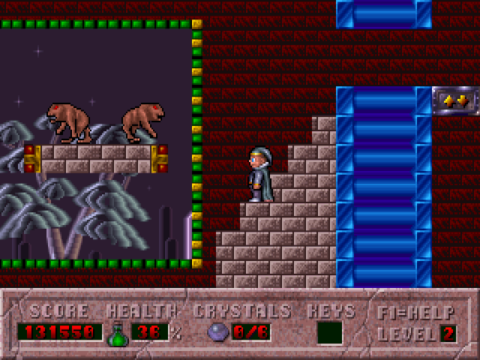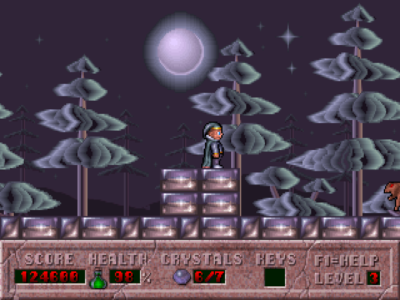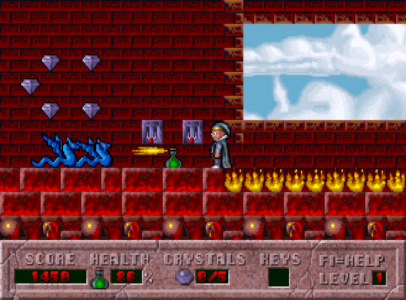
Hocus Pocus
Written by: Stoo
Date posted: May 22, 2023
- Genre: Action
- Developed by: Moonlite Software
- Published by: Apogee Software
- Year released: 1994
- Our score: 6
Our journey through early 90s shareware actions games moves at a slow and erratic pace. Still, over years we’ve added a whole stack of them to our archive, from the bleeping CGA of Monuments of Mars to fast and flashy Jazz Jackrabbit. One day I’d like to have covered more or less all of the oldschool platform games and shoot-em-ups from Apogee and Epic Megagames, the two leaders of that scene. Right now our most glaring omission would be the original Commander Keen, since its smooth scrolling graphics were a technical innovation, and also it was the first creation from the guys who would form the mighty iD Software.
That’s not our game for today, though. Instead, as is my way I went trawling through the Apogee list, looking at some of their less well known offerings. Games like Crystal Caves or Monster Bash, the sort of thing only fairly hardcore DOS nerds (like us) recall. In the end I settled on this one, which apparently is so obscure it never even inspired anyone to create a Wikipedia page about it. It was created by Moonlite Studios, whose other output according to Mobygames is just a handful of self-published shareware games.
So then, here you are a young wizard apprentice named Hocus, on a mission to prove his worthiness to the ruling council of Wizards. You must make your way through many hazardous places, avoid or defeat the monsters within, and search for hidden magical gems.
1994 is fairly late into that golden age of platformers so you might go in with certain expectations for how they might looks. This one is a bit of a mixed bag – with VGA graphics, there’s plenty of colour and several distinct styles of levels from Ancient Egypt to frozen north. Some reasonably attractive backdrops also.
On the other hand, each level basically feals like some sort of castle vault or dungeon, just with a different colour scheme. The game is built entirely of square tiles, without a slope or ladder to be found. There’s also not much in the way of detail apart from blocks in the foregrounds, while those backgrounds are routinely covered over with something plainer since you’re meant to be inside. The end result does feel like something from an older generation of platformers, with VGA graphics tacked on top.
Also, while it moves at a decent clip, it’s not quite fluid in its animation. As far as I can tell, both the animation and Hocus’ motion increase in increments of several pixels, presumably the smallest building block of level geometry, Then again, sitting at my PC lightly tapping the keyboard and counting pixels is probably the pinnacle of retro gaming dorkiness, so maybe I should move on.
Rather than being immediately present in the levels, enemies teleport in as you approach. This could annoying, and it does certainly discourage you from charging through too fast. Fortunately you get a few seconds warning in the form of sparkling visual effects. Monsters vary a lot in appearance but basically fall into types with certain pattern of attack and movement. For example there are some fliers with a shooting attack that is horizontal (so stand underneath them and shoot up!) and others that vertically (do not go underneath!).
It is easy to get overwhelmed if you run straight into a mob, but there are upgrades to increase your magic attack, either for the duration of the level or a brief but extremely powerful burst of firepower. Outside of shooting though, Hocus doesn’t get any special abilities apart from an occasional “high jump potion”. It seems like a missed opportunity in a game about wizards. Why not let him float through the air, or turn into some creature with different abilities? It wouldn’t have to be especially complex but some sort of novel feature, akin to Keen’s pogo stick, might have distinguished this game a little more from the competition.
Each level has a certain number of gems that must be found for completion. Usually, a few are behind locked doors. You have a fair bit of freedom to explore, in fact some maps can be quite labyrinthine in layout. So you’ll have to be thorough in your searching, and keep a mental record of which paths you’ve yet to explore. The game is also fond of puzzles based on the right combination of up to three switches, which is easy enough if you’re methodical.
Apart from the primary gems there are also stacks of points items. Completionist instincts pushed me to try and find the lot on each stage, (granting a further bonus to your score) but they serve no actual purpose. In other games of this ilk extra lives were tied to reaching certain scores, but here you have unlimited lives. Which, actually, is fine by me. It makes for a relatively un-stressful game on regular difficulty, at least for three chapters – the fourth is quite stingy with health-replenishing potions.
Ultimately Hocus Pocus does all feel a bit amateurish and unambitious. Just compare to Jazz Jackrabbit from the same year, which was more or less console-grade. The Commander Keen sequels,three years earlier, weren’t far off that standard either, even with their EGA graphics. This one can’t be called an equal of either. That said, it doesn’t make any outright errors. In fact, once you settle into its rhythms, it turns out to produce some agreeable sessions of platforming. Hunt for gems, zap the funny little imps and monsters, take in the midi music I found that playing through a few levels was a good way to unwind in the evening, when lacking the energy for Serious Gamer Games. So you may find this worth a look – after all, thanks to the shareware mode you can just try the first chapter before committing to the rest.




 Posts
Posts